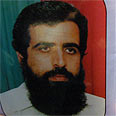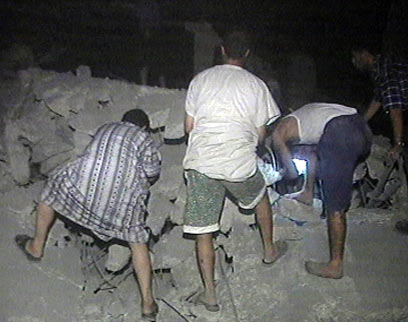
Report: Shehadeh killing legitimate; civilian deaths due to intel failure
In report submitted to PM, inquiry commission says 2002 attack in Gaza on top Hamas figure 'who posed certain, immediate and significant threat to Israel's population' was imperative; difficult collateral consequences of strike, in which uninvolved civilians were killed, became clear in hindsight. MK Tibi: 'Assassins should be prosecuted'
A report submitted to Prime Minister Benjamin Netanyahu on Sunday determined that the targeted killing of senior Hamas figure Salah Shehadeh on July 22, 2002 was imperative as he posed a 'certain, immediate and significant' threat to Israeli citizens.
The Special Investigatory Commission concluded that Shehadeh's terrorist activity categorized him "a civilian taking a direct part in hostilities at that time" and that his classification by the Shin Bet as a target was professional, based on concrete information and in accordance with the principles of Israeli and international law.
Therefore, the committee said, the strike against Shehadeh, "which was intended to terminate his deadly activity, was a legitimate targeted killing".
The commission further concluded that the difficult collateral consequences of the strike against Shehadeh, in which 13 uninvolved civilians, mostly women and children, were killed and many others injured, became clear in hindsight to most of the senior officials involved in the planning and implementation of the operation.
The officials, according to the committee, stated that had they foreseen in real-time the scope and gravity of the collateral damage which actually resulted, the operation would not have been carried out.
"The said consequence was unintended, undesired and unforeseen. It did not stem from disregard or indifference to human lives," the committee determined.
During the operation, a one-ton bomb was dropped on the house in which Shehadeh was staying, killing him, Hamas figure Zahar Natzer, Shehadeh's wife Layla and his 15-year-old daughter Iman, who were with him in the house.
Following the operation, a petition was filed with the High Court of Justice requesting that it order the military advocate general and the attorney general to open a criminal investigation against the air force commander, the chief of general staff, the minister of defense and the prime minister of Israel, in order to determine whether criminal offenses had been committed in the course of the planning and implementation of the operation.
In January 2008 then Prime Minister Ehud Olmert appointed a committee comprising three members: Former Military Advocate General Brig. Gen. (res.) Tzvi Inbar (committee chairman), Maj. Gen. (res.) Yitzhak Eitan and Yitzhak Dar.
Following the passing of Atty. Inbar on August 31, 2009 Netanyahu appointed retired Supreme Court Justice Tova Strasberg-Cohen as commission chairperson.
The committee determined that the targeted killing against Shehadeh was imperative because of the increase and escalation in terrorist attacks since 2000, in a manner which led to a situation of actual war, classified as an "armed conflict". These attacks were carried out mainly by the Hamas movement, to which Shehadeh belonged as one of its senior leaders and head of its Operational Branch. Shehadeh was the driving force behind the Hamas, its ideology and its operations, and was directly involved in the planning and execution of deadly terror attacks, the report said.

'Inconsistent intelligence.' Scene of 2002 strike in Gaza (Archive photo: AP)
"This situation necessitated effective, immediate and pinpointed measures to eliminate or at least minimize the attacks. One of the means chosen for this purpose was targeted killings against the leading planners and perpetrators of terrorist attacks," according to the report.
"Other alternatives that were considered were not implemented, either because the chances of success were uncertain or because Shehadeh switched houses during the planning stages or because there was too great a risk to Israeli forces or to uninvolved civilians resulting from, inter alia, the difficulties involved in a ground operation in a densely-populated area."
'Principle of proportionality'
The committee also concluded that all those involved in the operation showed "awareness and sensitivity" throughout the entire operation with regards to the risk to uninvolved civilians and the "duty to avoid or minimize it to the extent possible, in line with the principle of proportionality.
"In addition, the operation was aborted twice because of the presence of a minor, Shehadeh's daughter, in the house at the time the strike was planned to have taken place. Notwithstanding all this, a gap arose between what was expected and what actually occurred. The central reason for this gap was incomplete, unfocused and inconsistent intelligence information with regard to the presence of civilians in the structures adjacent to the Shehadeh house (the garage and huts), where most of the civilians died," the report stated.
According to the committee, this gap stemmed from "incorrect assessments and mistaken judgment based on an intelligence failure in the collection and transfer of information to the various echelons involved in the points of contact between the different agencies involved, and from a lack of sufficient understanding regarding the uncertainty that was created as a result of this unfocused, inconsistent and incomplete intelligence information which was before the decision-makers.
'War crime.' Site of targeted killing in Gaza (Archive photo: Reuters)
"The appropriate balance between the overall considerations of the decision-makers was disrupted, in a way that led to disproportionate harm to uninvolved civilians."
The committee stated that the rules of Israeli and international law "unequivocally remove any suspicion that a criminal offense was committed by any of those involved in the operation, adding that it does not recommend that personal measures be taken against any of those involved in the operation.
Shortly after the operation, the committee said, investigations were conducted by the various branches of the security forces, after which "lessons were learned and internalized by the security forces and incorporated both in writing and orally in training, lectures and regulations. Changes were also introduced accordingly in the mechanisms dealing with targeted killing operations.
According to the committee, the political echelon "also incorporated lessons learned from the operation and its consequences. Today, the procedure for transferring intelligence information to the political echelon is more organized, and decisions by the security services are more carefully scrutinized. There is awareness regarding initiation of meetings with the heads of the security services and the need to request clarifications as appropriate to ensure that the most independent and well-informed decision is made as necessitated by domestic and foreign policy considerations, particularly with regard to possible harm to uninvolved civilians as a result of targeted killings."
The committee recommended that security forces "incorporate and internalize, on an ongoing basis, the principles and norms of Israeli and international law and the ethical and moral foundations on which they are predicated, particularly in all that relates to harm to uninvolved civilians resulting from a targeted killing against a legitimate target.
In addition, the report stated that the "principle of proportionality must be carefully adhered to. A derivative of this principle is that a strike should not be carried out, even if the target is in and of itself legitimate, if the expected harm to uninvolved civilians is excessive in relation to the anticipated military advantage to be derived from the strike, and this in each case according to its circumstances. In this context, maximum caution must be exercised in the selection of the method of striking the target and the type of weapon to be used in the operation.
'Assassination succeeded'
"The required balance was not properly achieved in the targeted killing against Shehadeh. Decisions were made on the basis of flawed, incomplete and inconsistent information which led to misunderstandings, erroneous assessments and mistaken judgment, which resulted in an unforeseen, undesired and unintended outcome," according to the report.
Knesset Member Avi Dichter (Kadima) who had served as Shin Bet chief at the time addressed the conclusions and noted that "it is important to state and admit: 'The assassination succeeded but the operation failed'."
Dichter added that "Shehadeh's daughter was the reason why we didn't approve the attack so long as she was with him. That, more than anything else proves how much consideration and attention was given to avoiding harming the innocent."
Meanwhile, MK Ahmad Tibi (United Arab List-Ta'al) also addressed the issue, stating "those responsible for the assassination carried out a war crime and should be prosecuted for killing innocent women and children. The planners and implementers new in advance the price the civilian population would pay.
- Follow Ynetnews on Facebook











